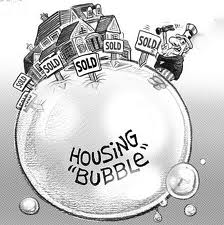
BLOG
Higher Home Prices Cool Buying Frenzy
Is all this frenzy creating a mini-housing bubble? What are your thoughts on this housing market? Laura Key 310.866.8422
The recent rise in home prices has more investors concerned that it will be increasingly difficult to turn a profit from their rental investments. Nearly half of U.S. real estate investors say they expect to purchase fewer rental homes in the next year, according to a recent survey conducted by polling firm ORC International.
Just 10 months ago, the percentage of investors who said they intend to buy fewer homes stood at 30 percent—compared to 48 percent today. Only about 20 percent of the investors surveyed say they plan to buy more homes in the next year—a drop from the 39 percent who reported they intend to buy more homes last August.
More than half of the investors surveyed who own rental properties say they plan to hold them for at least five years or more, and 33 percent plan to hold them for 10 years or more.
“Higher prices are reducing returns on investment and investors are responding by cutting back on their purchasing plans until conditions sort out,” says Chris Clothier, a partner in MemphisInvest.com and Premier Property Management Group. “Fewer foreclosures, rising property values, and competition from hedge funds are making it tough to find good ideals on distressed sales. On the other hand, investors are planning to hold onto their rental properties for at least eight to 10 years and realize the benefits of rising rents and low vacancy rates. Cash flow is much more important than appreciation.”
Source: ORC International
Laura Key, CBS News, Buyer's Agent, Selling Agent,
Thinking of Selling? I have buyers who are pre-approved and ready! They are looking in several areas of Los Angeles county!
Economist Quashes Housing Bubble Rumors
I love what I do; however I have reservations about this report. I have had deep conversations with other agents and I firmly feel we are in a danger zone. Your thoughts? Laura Key 310.866.8422
Recently, rumblings of another housing bubble have been emerging, but one economist says with inventories expected to rise soon, the housing market is not at threat.
Rick Sharga, executive vice president with Carrington Mortgage Holdings, told a crowd at the REOMAC 2013 Summit & Expo in Dallas on Monday that the housing market should expect things to get worse before they start improving.
But “this is not the 2005 market,” he said. “We are not creating a bubble.”
Sharga says the lack of available home inventory is the reason why home prices are rising. New-home inventories are at their lowest level in more than 30 years, he said. “Very few markets are anywhere near where we were at the peak,” he said. The markets showing some “bubble-like tendencies” are housing markets that saw the biggest declines, he noted.
LPS Applied Analytics recently predicted that home prices could rise another 35 percent without affecting affordability.
Sharga predicts that by this time next year there will be too many homes for sale. Housing and foreclosure starts are expected to start rising within the next year.
Source: “Carrington’s Sharga: We Are Not Creating Another Housing Bubble,” HousingWire (April 8, 2013)
Home Prices Surge Despite Distress
For nine straight months, national home prices have been in the positive, and the gains are only getting larger. The latest reading for November shows a 7.4 percent jump from a year ago, according to CoreLogic. That includes sale prices of distressed properties, bank-owned homes and short sales. This is the largest year-over-year jump since 2006 when we were at the height of the housing boom.
"As we close out 2012 the pending index suggests prices will remain strong," wrote Mark Fleming, chief economist for CoreLogic in a release. "Given that the recently released Qualified Mortgage rules issued by the Consumer Financial Protection Bureau are not expected to significantly restrict credit availability relative to today, the gains made in 2012 will likely be sustained into 2013."
Some had predicted price gains of between three and five percent in 2013, but these numbers seem to indicate the market could outpace expectations.
While competition among investors for distressed properties drove home price gains in much of 2012, the non-distressed market appears to be catching up. Excluding distressed sales, home prices still saw a healthy 6.7 percent annual gain in November, and analysts at CoreLogic are predicting an even larger 8.4 percent jump in December.
"For the first time in almost six years, most U.S. markets experienced sustained increases in home prices in 2012," said Anand Nallathambi, president and CEO of CoreLogic. "We still have a long way to go to return to 2005-2006 levels, but all signals currently point to a progressive stabilization of the housing market and the positive trend in home price appreciation to continue into 2013."
Just six states, Delaware, Illinois, Connecticut, New Jersey, Rhode Island and Alabama saw annual price depreciation. New Jersey still has a huge backlog of distressed properties, as does Illinois. Arizona, Nevada and California are seeing big home price gains, as investors there continue to inhale properties to take advantage of the very lucrative rental market. Still, even excluding distressed sales, Nevada saw a 12 percent jump in home prices.
There are, however, still looming headwinds to home prices, as banks ramp up foreclosures especially in states that require these cases to go before a judge. That new inventory could slow price gains in those states. Inventory, or lack thereof, is the primary driver of much of these gains. There were just 2.03 million homes for sale in November, according to the National Association of Realtors, a 23 percent drop from November of 2011 and the lowest supply since September of 2005.
Some are concerned that low inventory and not increased demand is juicing prices faster than is healthy for the housing recovery. If prices start to outpace earnings and employment growth, and then more properties hit the market this Spring, these gains could take a U-turn.
Source: CNBC by By: Diana Olick
Buyers are starting to have a hard time finding the homes they need! Let me help guide you through the market to help you obtain the home you need before prices go to far! Laura Key www.KeyCaliforniaHomes.com



